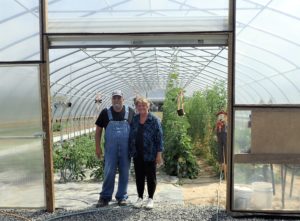
ECP helped Joe and Diana clean up and reboot their operation after the devastating storm.
By Lillian Stout, West Virginia FSA Program Technician
Thirty-five years ago, Joe and Diana Sparks traded in their home in Ohio for the ridgetop views of Braxton County, West Virginia. Located in the heart of the Appalachian Mountains, the couple’s dreams took root in the shape of a four-acre orchard, dispersed with apple trees, peach trees and honeybee hives.
For many years their orchard operation was enough to sustain the farm.
Like many producers in West Virginia, the couple saw their hard work disappear in the blink of an eye when a catastrophic flood hit in 2016. The ensuing wind wiped out many of the trees they had nurtured for thirty-five years.Joe and Diana were able to clean up and reboot their operation after the devastating storm with help from the Emergency Conservation Program (ECP), administered by the USDA Farm Service Agency (FSA). The program provides emergency funding for agricultural producers to rehabilitate land severely damaged by natural disasters.
“The damage caused by the severe storms in 2016 was unlike any that I had ever experienced,” said Melodie Bailey, FSA county executive director. “As an FSA employee, it was rewarding to provide assistance under ECP to local agricultural producers like Joe and Diana.”

The high tunnel has helped Joe and Diana to produce higher yields.
With such a staggering loss to their orchard, Joe and Diana refocused their operation. With the help of the USDA Natural Resources Conservation Service (NRCS), they installed a high tunnel in the fall of 2016 through the Environmental Quality Incentive Program (EQIP). They now grow over 35 different crops ranging from watermelons to blueberries.
“Transitioning from the orchard to the high tunnel has enabled us to control several variables, including water intake, temperature and insects, which allows us to produce higher yields,” said Diana.
Over the last 10 years, Joe and Diana have enjoyed selling their crops and cultivating relationships with customers at the Summersville Tailgate Market.
To protect themselves from future weather events, they manage their risk with the FSA Noninsured Crop Disaster Assistance Program (NAP), which provides financial assistance to producers of noninsurable crops when low yields, loss of inventory, or prevented planting occur due to natural disasters.
In addition to ECP and NAP, USDA offers a variety of risk management, disaster, loan, and conservation programs to help agricultural producers in the United States weather ups and downs in the market and natural disasters as well as invest in improvements to their operations.
For more information and to find your local service center, visit farmers.gov.





